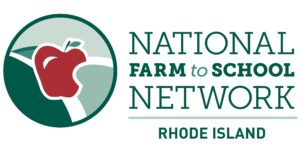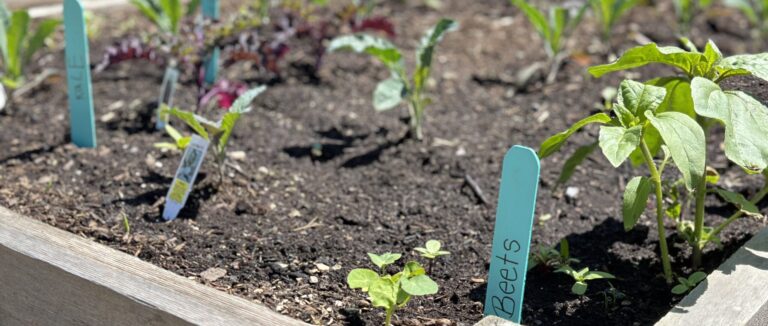school gardens

A school garden can provide a multitude of experiential learning opportunities for students across many
academic content areas, such as science, math, reading and art. School gardens allow students to have
a hands-on approach to learning and make a classroom curriculum come alive and become more relevant.
School gardening can take the form of an indoor window garden, planter box, hydroponic system,
outdoor raised bed, hoop house, greenhouse, or even a school farm!
Nutrition & Lifestyle
Garden programs bring students into an outdoor classroom where broader lessons about nutrition,
physical activity, and the environment take place. Whether growing vegetables, fruits or a variety of herbs,
edible gardens are a valuable tool that schools can use to promote healthier eating and active living
while sharing with students an appreciation of locally grown food and environmental stewardship.
Kids are more likely to eat and enjoy foods they have planted and
harvested themselves, and gardening is a great exercise!
Academic & Social/Emotional Development
Garden programs improve student attitudes towards learning and can increase overall
academic performance. Students who garden develop other skills such as curiosity, flexibility,
creativity and critical thinking that help them learn more effectively.
Research suggests gardening in school improves students’ social skills and
behavior while working together with their teachers and each other.
Resources
GET ROOTED
DIG DEEPER
Find more resources and specialized content to deepen and expandgardening in schools.
CULTIVATE SUCCESS

The URI School Garden Initiative website is a great place to start.
- Download the How-to Guide for RI School Gardens to walk through the steps of planning, building, teaching in and maintaining a school garden.
- Explore the Find Funding page for a list of school garden grants.
- Access technical Gardening Resources from URI Cooperative Extension including the RI Planting Calendar, the Native Plants database and the URI Gardening & Environmental Hotline.
- Sign up for their newsletter to receive the seed order form for the URI Free Seed Program.

- Starting and Maintaining a School Garden is a step-by-step outline for getting started with a school garden, including design, funding, planting and supply, and maintenance ideas.

The UMass Soil and Plant Nutrient Testing Lab is the only local lab that offers the Total Sorbed Metals Test which tests for multiple contaminants in addition to the Routine Soil Analysis which tests for pH, nutrients and lead.
Every school garden should start with a soil test.

The Rhode Island Resource Recovery Corporation offers free compost to Rhode Island schools either directly or through their municipality. The only catch is that you have to pick it up.

Kids Gardening offers a range of activities that can be done in or out of the classroom. Explore gardening basics with plenty of indoor options like starting seeds, setting up grow lights or even using a hydroponics system. Join their Northeast school gardens discussion group to learn from others in the region and share your ideas.
 Searchable database by topic (nutrition, food justice, farm to cafeteria, policy, data, statistics and more) and for non-English resources.
Searchable database by topic (nutrition, food justice, farm to cafeteria, policy, data, statistics and more) and for non-English resources.

The U.S. Fish & Wildlife Service Schoolyard Habitat Program helps schools create outdoor classrooms in their own wildlife habitats.
- Download the Schoolyard Habitat Project Guide to get started.
- Download the Schoolyard Habitat Curriculum Guide with tips for teaching outside.

The RI Environmental Education Association is committed to advancing environmental education through collaboration.
- Search RIEEA’s Educator Resource Directory for environmental education partner organizations.
- Join RIEEA’s listserv to communicate with others and learn about environmental education topics and resources.

Massachusetts Farm to School offers school garden webinar recordings on topics such as planning, classroom management, food safety and more.

Life Lab offers a wide range of school garden support including excellent curriculum resources connected to standards.
- Explore their video library of Back Pocket Activities designed to get teachers started using the garden as a learning tool.
- If anyone still needs convincing of the benefits of school gardens, The Value of Garden-Based Learning page offers a range of peer-reviewed articles.

The RI Healthy Schools Coalition offers advice for inserting school garden language directly into your district/school wellness policy to integrate nutrition education and promotion into the larger school environment and increase the garden’s use and sustainability.
- Download the handout Incorporating School Garden Language into School Wellness Policies.
- Sign up for their newsletter for school wellness news, grant opportunities and more.
Summer in the School Garden – A Resource for Working with Volunteers to Maintain your School Garden addresses the challenge of summer maintenance with an exploration of maintenance models and best practices.

